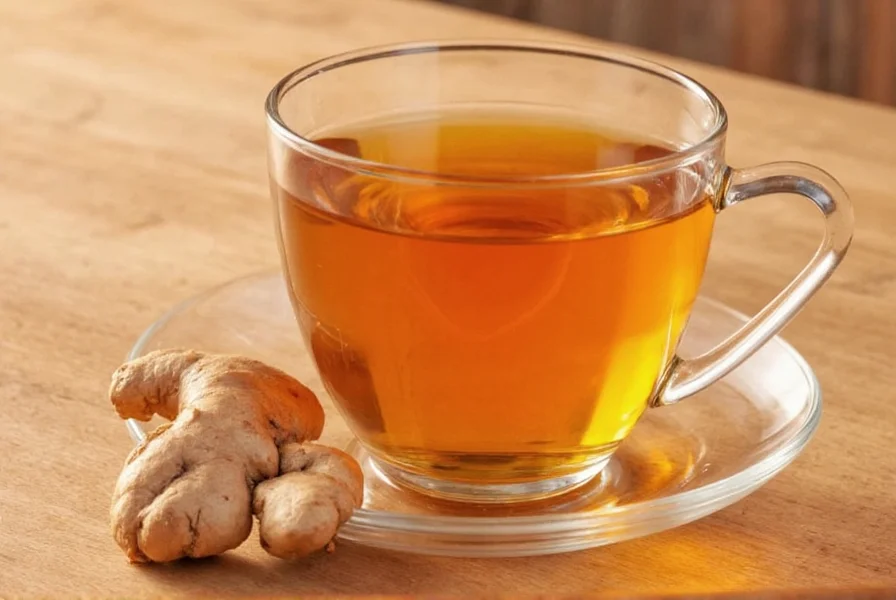Heartburn affects millions worldwide, prompting many to seek natural remedies like ginger tea. While conventional medications work well for many, some prefer gentler approaches for occasional discomfort. Understanding whether ginger tea for heartburn delivers real benefits requires examining both traditional use and scientific evidence.
How Ginger Works on Digestive System
Ginger contains bioactive compounds called gingerols and shogaols that influence digestive processes. These compounds may help with natural remedies for occasional heartburn through several mechanisms:
- Reducing inflammation in the digestive tract
- Potentially accelerating gastric emptying, which decreases stomach pressure
- Exhibiting antioxidant properties that protect digestive tissues
- Modulating stomach acid production in some studies
Unlike antacids that neutralize acid immediately, ginger works more subtly on digestive function. This makes it potentially suitable for mild heartburn relief with ginger tea rather than severe acid reflux episodes.

Scientific Evidence on Ginger Tea for Heartburn
Research specifically examining ginger tea's effects on heartburn remains limited. However, several studies provide insight into ginger's digestive benefits:
| Study | Findings Related to Digestion | Relevance to Heartburn |
|---|---|---|
| Nicole et al., 2020 (Journal of Gastroenterology) | Ginger accelerated gastric emptying by 25% in test subjects | Faster emptying may reduce stomach pressure that causes heartburn |
| Marx et al., 2017 (Phytotherapy Research) | Ginger reduced nausea and improved digestion in 60% of participants | Suggests potential for soothing digestive discomfort including mild heartburn |
| Wigler et al., 2003 (Arthritis & Rheumatism) | Significant anti-inflammatory effects observed | May help reduce esophageal inflammation from acid exposure |
Most research focuses on ginger's effects on nausea, gastric motility, and inflammation rather than directly on heartburn. The connection between scientific evidence ginger tea heartburn remains somewhat indirect, though biologically plausible.
Proper Preparation and Usage Guidelines
For those interested in trying ginger tea for occasional heartburn relief, preparation matters. The proper preparation of ginger tea for heartburn involves:
- Using fresh ginger root (about 1-2 inches) sliced or grated
- Steeping in boiling water for 5-10 minutes (longer for stronger tea)
- Consuming 20-30 minutes before meals that typically trigger heartburn
- Starting with weaker concentrations to assess tolerance
Avoid adding honey or sugar, which might trigger heartburn in some people. Drink the tea warm but not hot, as extreme temperatures can irritate the esophagus. For how to use ginger tea for heartburn effectively, consistency matters more than intensity—daily moderate consumption works better than occasional strong doses.

Important Limitations and When to Seek Medical Help
Ginger tea isn't appropriate for everyone experiencing heartburn. Certain conditions warrant medical consultation rather than home remedies:
- Heartburn occurring more than twice weekly
- Difficulty swallowing or painful swallowing
- Unintentional weight loss alongside heartburn
- Symptoms persisting despite home remedies for 2+ weeks
- History of Barrett's esophagus or other serious digestive conditions
Ginger may interact with blood thinners and diabetes medications. Those with gallstones should consult doctors before regular ginger consumption. Remember that ginger tea benefits for digestive health don't replace professional medical care for chronic conditions.
Ginger Tea Compared to Other Natural Remedies
Among ginger tea vs other heartburn remedies, each approach has different mechanisms and evidence levels:
- Aloe vera juice: Soothes inflammation but limited evidence for heartburn specifically
- Chamomile tea: Calms digestion but may not directly address acid reflux
- Slippery elm: Forms protective coating but quality varies significantly between products
- Baking soda: Provides immediate but temporary relief through neutralization
Ginger's advantage lies in potentially addressing the underlying digestive process rather than just symptom relief. However, for severe or frequent heartburn, conventional treatments like H2 blockers or proton pump inhibitors remain more reliable based on current evidence.
Frequently Asked Questions
Does ginger tea help with heartburn immediately?
Ginger tea doesn't provide immediate relief like antacids. Its effects are more gradual, potentially reducing heartburn frequency when consumed regularly before meals. Most people don't experience instant relief from ginger tea for acid reflux relief, but may notice improvement in digestive comfort over days or weeks with consistent use.
Can ginger tea make heartburn worse?
Yes, for some individuals. Ginger's stimulating effect on digestion might increase stomach activity and potentially worsen heartburn in certain people, especially when consumed in large quantities or on an empty stomach. Those with severe GERD often report that ginger tea side effects for heartburn include increased symptoms rather than relief.
How much ginger tea should I drink for heartburn?
Start with 1 cup (8 ounces) of moderately brewed ginger tea 20-30 minutes before meals that typically trigger heartburn. Don't exceed 3-4 cups daily. For mild heartburn relief with ginger tea, consistency matters more than quantity—daily moderate consumption works better than occasional strong doses. If symptoms worsen, discontinue use.
Is ginger tea safe for frequent heartburn?
Ginger tea alone isn't sufficient for frequent or chronic heartburn (occurring more than twice weekly). While it may complement treatment for occasional heartburn natural remedies, persistent symptoms require medical evaluation. Chronic heartburn could indicate GERD or other conditions needing professional treatment beyond home remedies like ginger tea.











 浙公网安备
33010002000092号
浙公网安备
33010002000092号 浙B2-20120091-4
浙B2-20120091-4